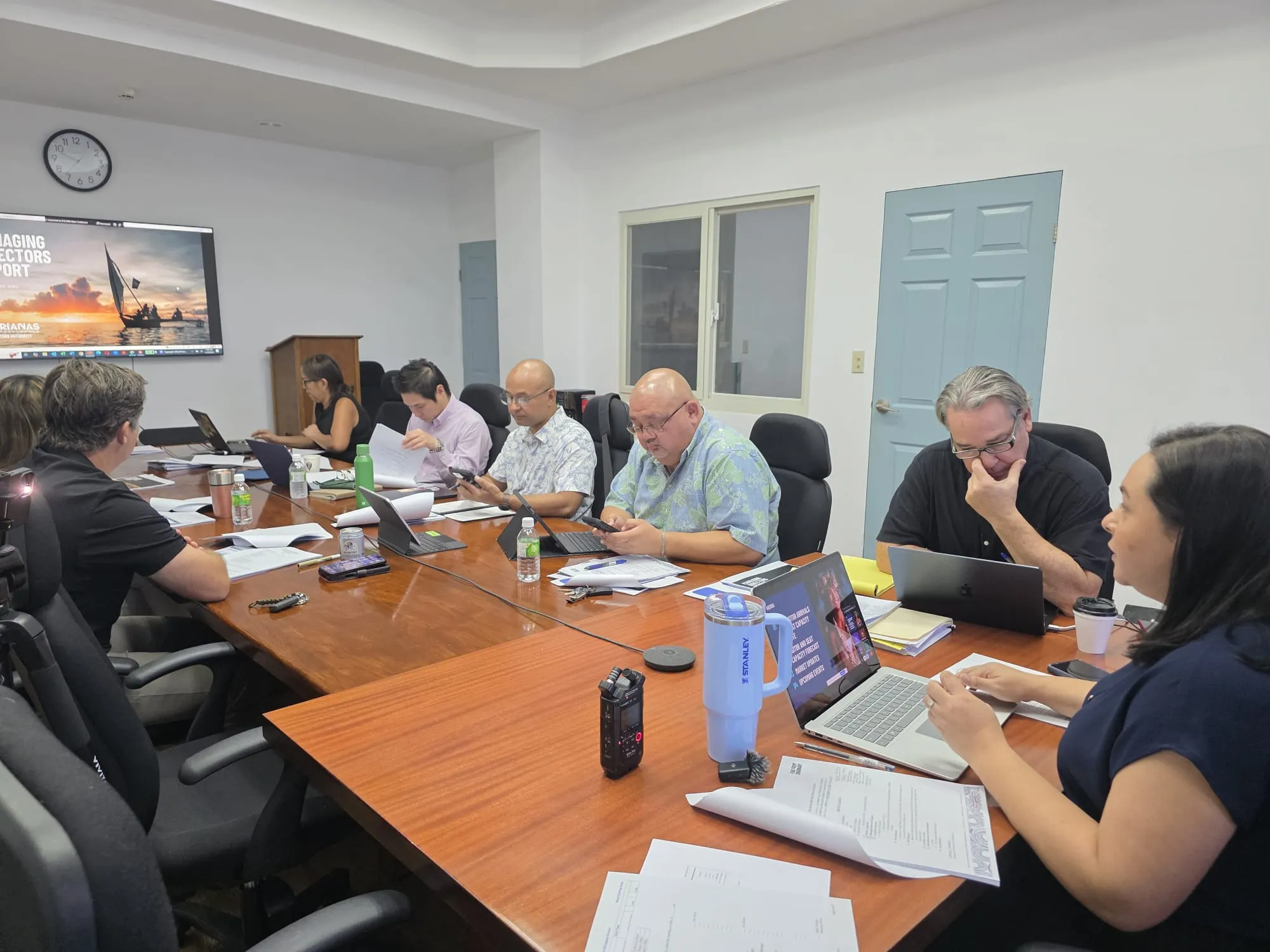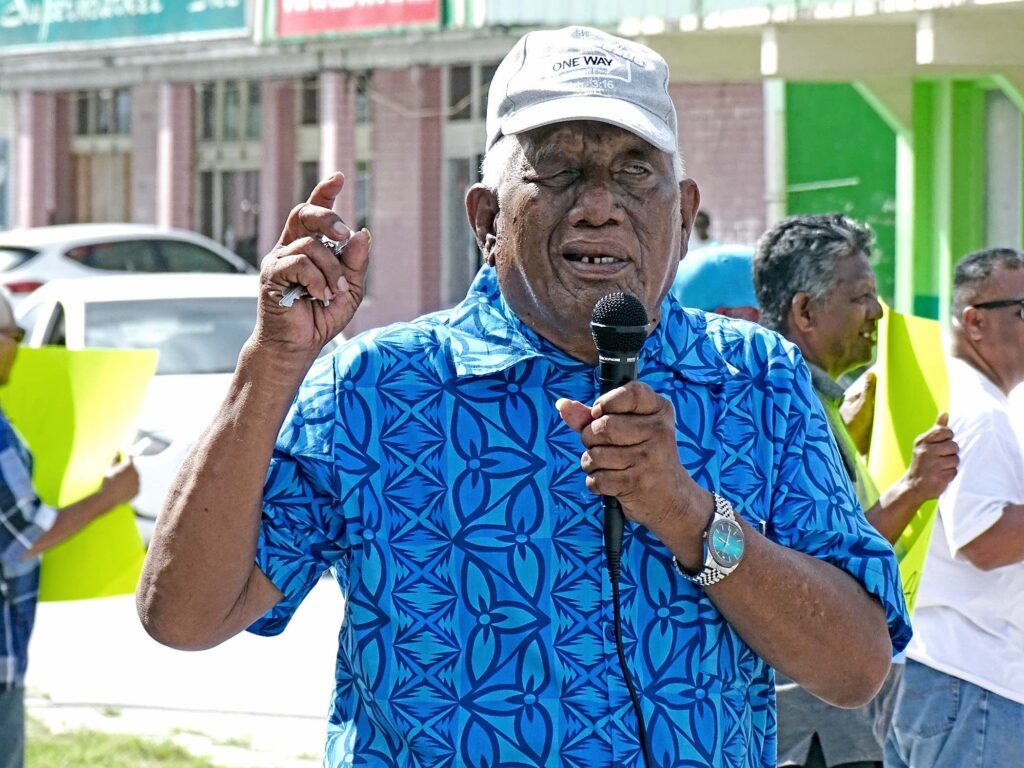MAJURO — In the tiny atoll community of Majuro, the capital of the Marshall Islands with a population of 23,156, a public protest here is a rarity, the previous one before last week occurring in 2010.
That Bikini islanders displaced by United States nuclear weapons testing in the 1940s took to the streets with placards twice this past week to demand accountability from their local government speaks to rising concern in that community about elected leaders who gained control of a U.S.-funded trust fund in 2017 and within three years virtually wiped out $71 million that had provided annual aid to the displaced community for 40 years.
All funding was halted in January this year after Bikini leaders, given the green light by the U.S. Interior Department to take over control of the Bikini Resettlement Trust Fund in 2017, bankrupted the Bikini Resettlement Trust Fund.
“We are tired of people playing with our money,” said Bikinian Tommy Leer at a protest outside the Kili-Bikini-Ejit or KBE Local Government town hall in Majuro Monday. “We won’t stand and watch people waste away our benefits.” The acronym “KBE” reflects the two islands — Kili and Ejit — where most of the displaced Bikini population resides, though hundreds have also migrated to the United States.
Following last Monday’s protest at the local government offices, on Thursday, dozens of Bikinians marched on the main road to the national government capital building to demand it use its power to place the KBE Local Government into receivership to facilitate forensic audits and a thorough investigation into spending by elected leaders.
The dispute has its roots in United States compensation provided to the Bikini people uprooted for 23 nuclear tests conducted on this Pacific atoll from 1946 to 1958.
In 1982, the U.S, Congress established the Bikini Resettlement Trust Fund with $20 million and then added another $90 million by the early 1990s. For 35 years, the KBE Local Government and the Interior Department worked together to ensure the annual drawdowns from the trust fund were controlled to maintain the fund. In 2016, the last year the trust fund was audited, it stood at $71 million — the result of ups and downs in stock market investments and ongoing usage.
Bikinian Anderson Jibas took office as mayor in January 2016 and lobbied the Interior Department to give KBE leaders control of the Bikini Resettlement Trust Fund to increase spending to “ensure our people are not starving.”
In November 2017, following a series of KBE requests for a “rescript” or change to the system for oversight of the Resettlement Trust Fund, U.S. Interior Department Assistant Secretary Doug Domenech ended over 35 years of Interior oversight of the trust fund. “The Trustee and Investment Advisors are now bound to take direction directly from the KBE Council through you as Mayor or your designee without any oversight from the Department as previously established in the 1988 Amended Resettlement Trust Fund Agreement,” said Domenech in a letter to Mayor Jibas at the time.
In 2016, before Domenech handed the fund over to KBE, the local government had used only $4.1 million from Bikini Resettlement Trust Fund, audit figures show. But once Interior washed its hand of oversight, a Deloitte audit in 2018 shows use of the trust fund skyrocketed to $16.6 million, a record drawdown in the then-nearly 40-year history of the fund. By December 2020, only $4 million remained in the trust fund, according to an annual report by Arden Trust Company, which manages the trust fund. By March this year, it was down to $100,000.
The local government, given the green light by the Interior Department, went on a spending spree in 2018 and 2019. Although there have been no audits issued of the trust fund since 2016, some of the high profile spending is known. KBE leaders spent $1.2 million to buy two landing craft vessels from Asia, bought a housing complex in Majuro, purchased a Dash-8 aircraft, and bought over 280 acres of land on the Big Island of Hawaii for $4.8 million. None of these investments have produced revenue for the KBE Local Government, for which the mayor blames disruptions caused by the Covid pandemic. The two vessels have remained anchored in Majuro and out of service for months, and the airplane was never used and has been in hangar storage in Taiwan since 2020.
Hundreds of Bikini Islanders living in the Marshall Islands and the United States have depended since 1982 on payroll or monthly stipends and scholarship aid provided by the KBE Local Government from the trust fund. In addition, a companion fund known as the Bikini Claims Fund, has been used to provide quarterly compensation payments to displaced islanders since the mid-1980s.
Because of some U.S. Congress members were unhappy with the Interior Department handing off control of the Resettlement Trust Fund to Mayor Jibas, in February 2018, the U.S. Senate Energy Committee held a special hearing on the situation. At that hearing, Jack Niedenthal, who had worked for over 30 years for the KBE Local Government as its liaison for the trust funds, said past leaders “understood how long we’d gone without anything and that this money would take care of their children and grandchildren.” Niedenthal’s prediction at the 2018 hearing that the Interior Department’s action handing over management of the trust fund to KBE political leaders put it “in danger of disappearing” has now come to reality.
Niedenthal said he was “deeply offended” by the Interior Department washing its hands of Bikini in light of the decades old promises to the displaced islanders. “In 1946, the U.S. made a promise to the Bikini people that has been quoted for decades by elders as if it were a verse from the Bible,” Niedenthal told the US Senate committee in 2018. “They were told (by U.S. officials in 1946) that no matter where the Bikinians found themselves — even if they were adrift on a raft at sea or were on a sandbar — they’d be taken care of as if they were America’s children.”
Niedenthal sharply criticized Domenech’s action of abdicating U.S. responsibility for oversight of the Bikini Resettlement Trust Fund in 2017. “No American official should have the right to tell the Bikinians not to come back to them for whatever reason after what the Bikinians have sacrificed for the United States and the world,” he said.
With virtually no money left in the Resettlement Trust Fund, and concerns that the Claims Trust Fund — according to the mayor it is now valued at $28 million, less than half its 2016 level of $57 million — is on the verge of depletion, the U.S. trustee bank halted further withdrawals last year, leaving the local government without resources. Since January, all local government funding to islanders halted, causing loans with banks to become delinquent and eliminating the primary source of income that the majority of Bikinians have depended on for daily needs since 1982.
A financial report on the Resettlement Trust Fund issued by fund manager Arden Trust Company, shows that as of March 31 this year, there was only $100,000 left in the trust fund that in 2016 had $71 million.
“You’ve been saying tomorrow there will be money,” said Bikini elder Simon Jamore at the KBE town hall protest this week. He is a grandson of King Juda, who led the Bikinians during the initial resettlement from Bikini by the U.S. Navy in 1946 that launched the first nuclear weapons tests. “Tomorrow, tomorrow, tomorrow. How many tomorrows you want us to wait?”
Jibas said in an interview last week with the Marshall Islands Journal that his administration is working “around the clock” to remedy the delay in payments. The mayor and his executives said the claims laid out by the local newspaper and international news media plus misinformation spread by Marshallese social media contributed to the delay in money disbursements by the trustee bank.
“Our goal hasn’t changed since we campaigned for office,” Jibas said. “And that goal is to ensure our people are not starving and that electricity is always on in our homes. We understand the minor setback caused by the trustees has affected power rationing on Kili, but the people living there are not complaining as portrayed by the media and the opposition challenging this administration.”
There has been no official response to the situation by the Marshall Islands national government. The Interior Department has issued a statement stating it had obtained financial records for the Resettlement Trust Fund, adding: “The department is currently reviewing what actions are necessary or appropriate given its surviving role with respect to the resettlement program and the trust fund documents.”
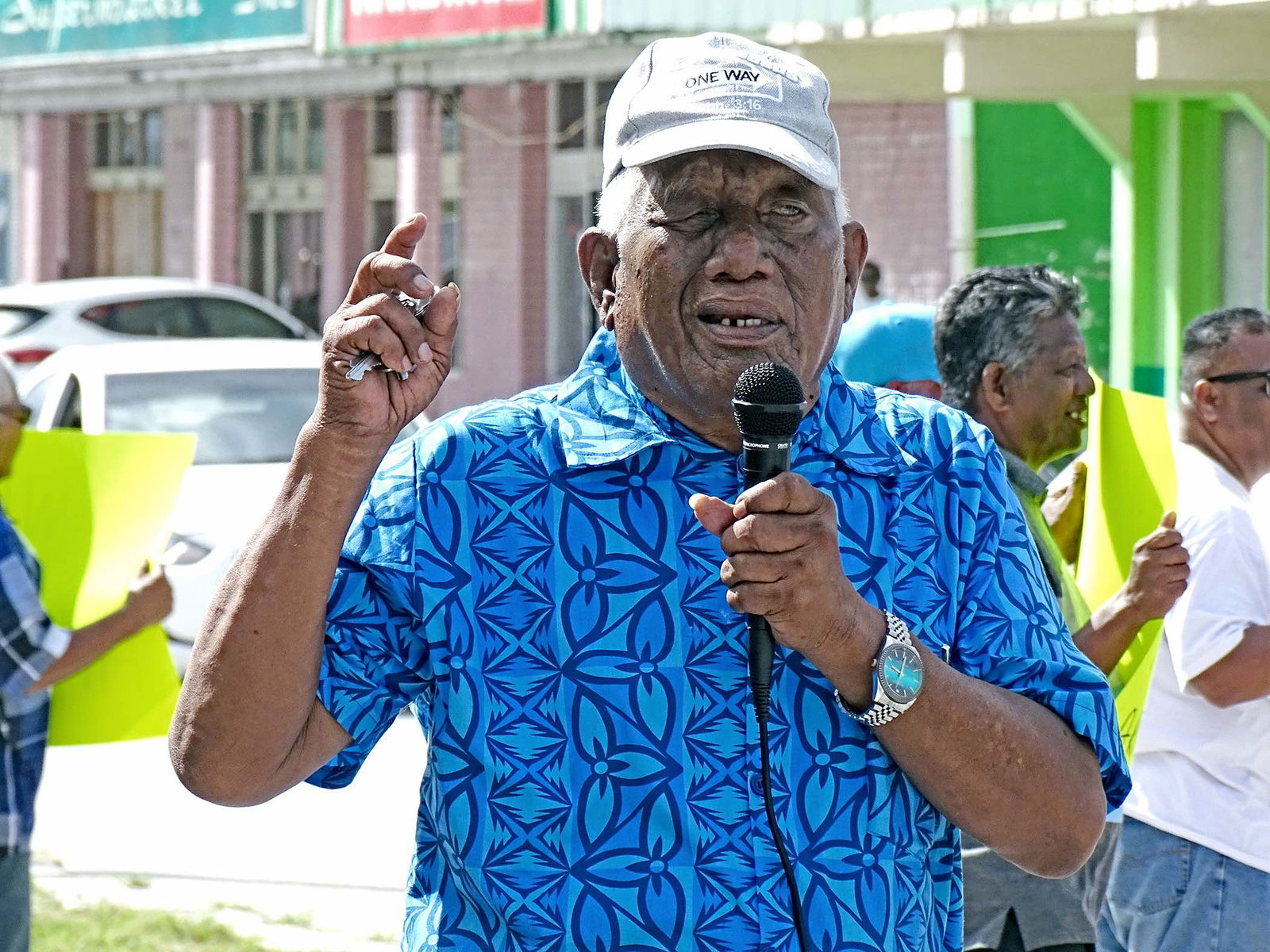
Bikini elder Simon Jamore, a direct descendant of islanders relocated by the U.S. Navy in 1946 to begin nuclear weapons testing, spoke at a protest over the use of money by the islanders elected leaders Monday last week in Majuro.
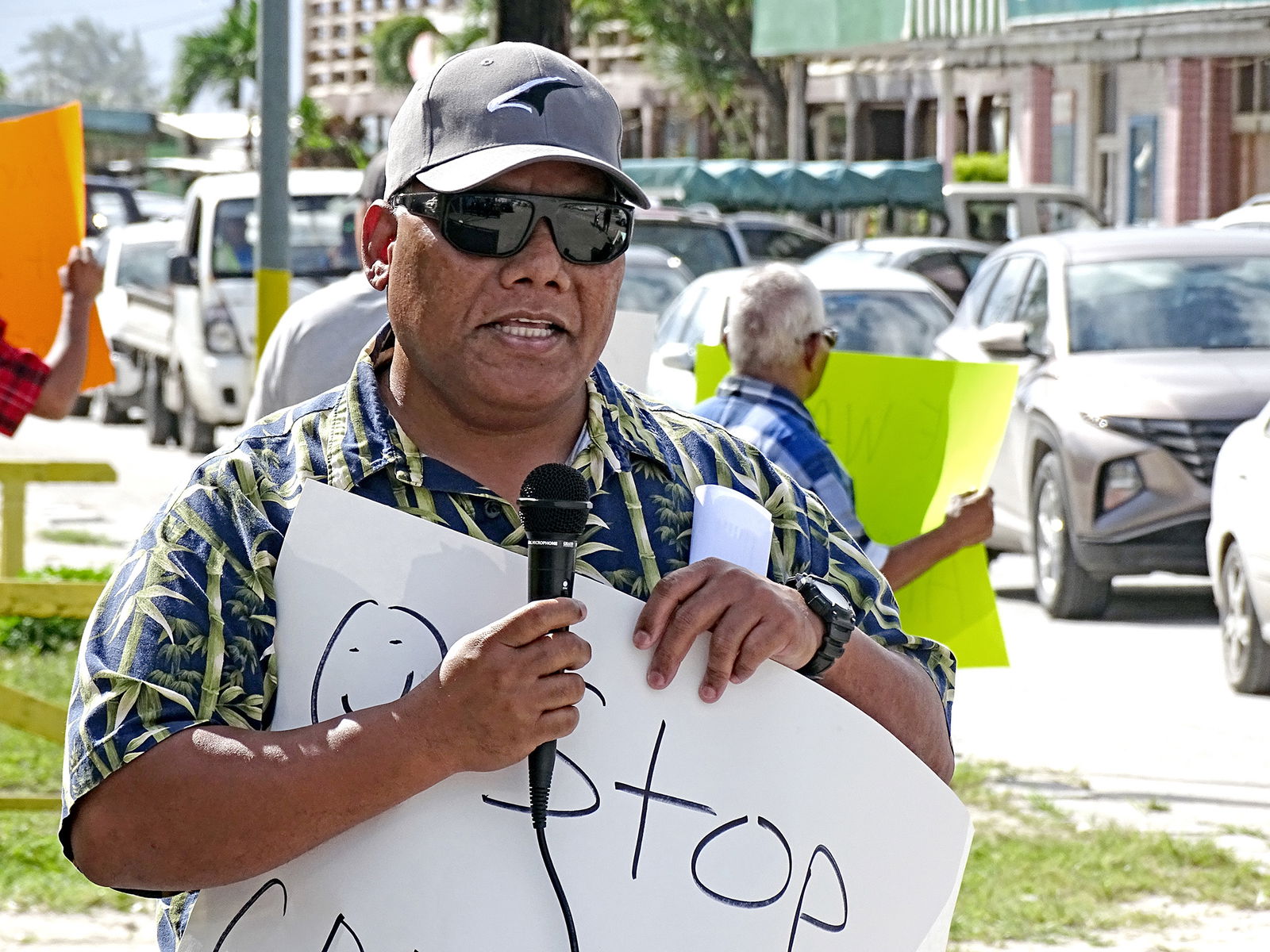
“We won’t stand and watch people waste away our benefits,” Bikinian Tommy Leer told a protest at the Bikini local government town hall this week about elected leaders’ wiping out the Bikini Resettlement Trust Fund. The fund had provided aid to displaced islanders since 1982.
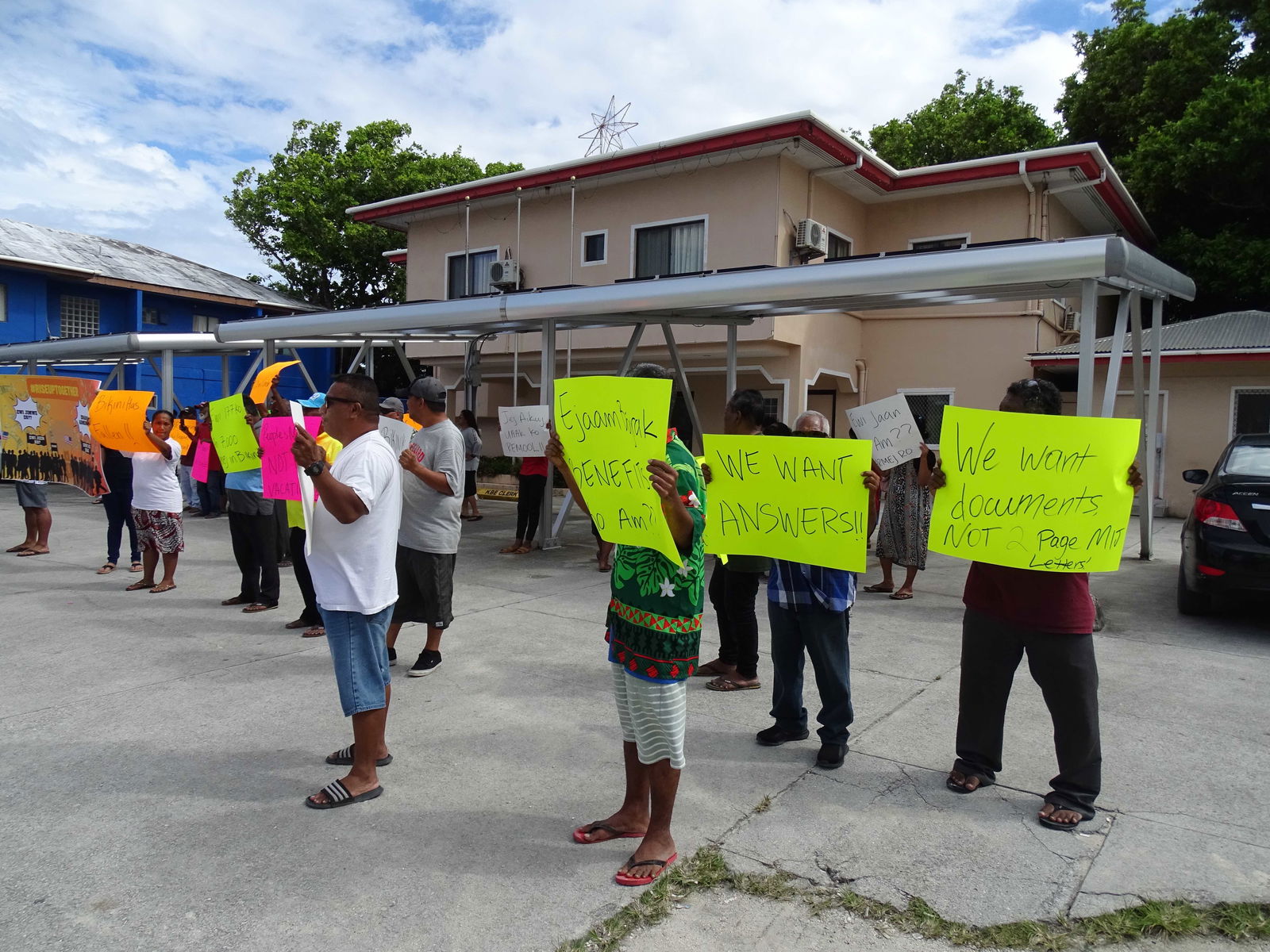
Bikini islanders demonstrate outside their local government town hall in Majuro calling for investigation into leaders’ spending that has exhausted a trust fund that provided aid to the displaced community for over 40 years.
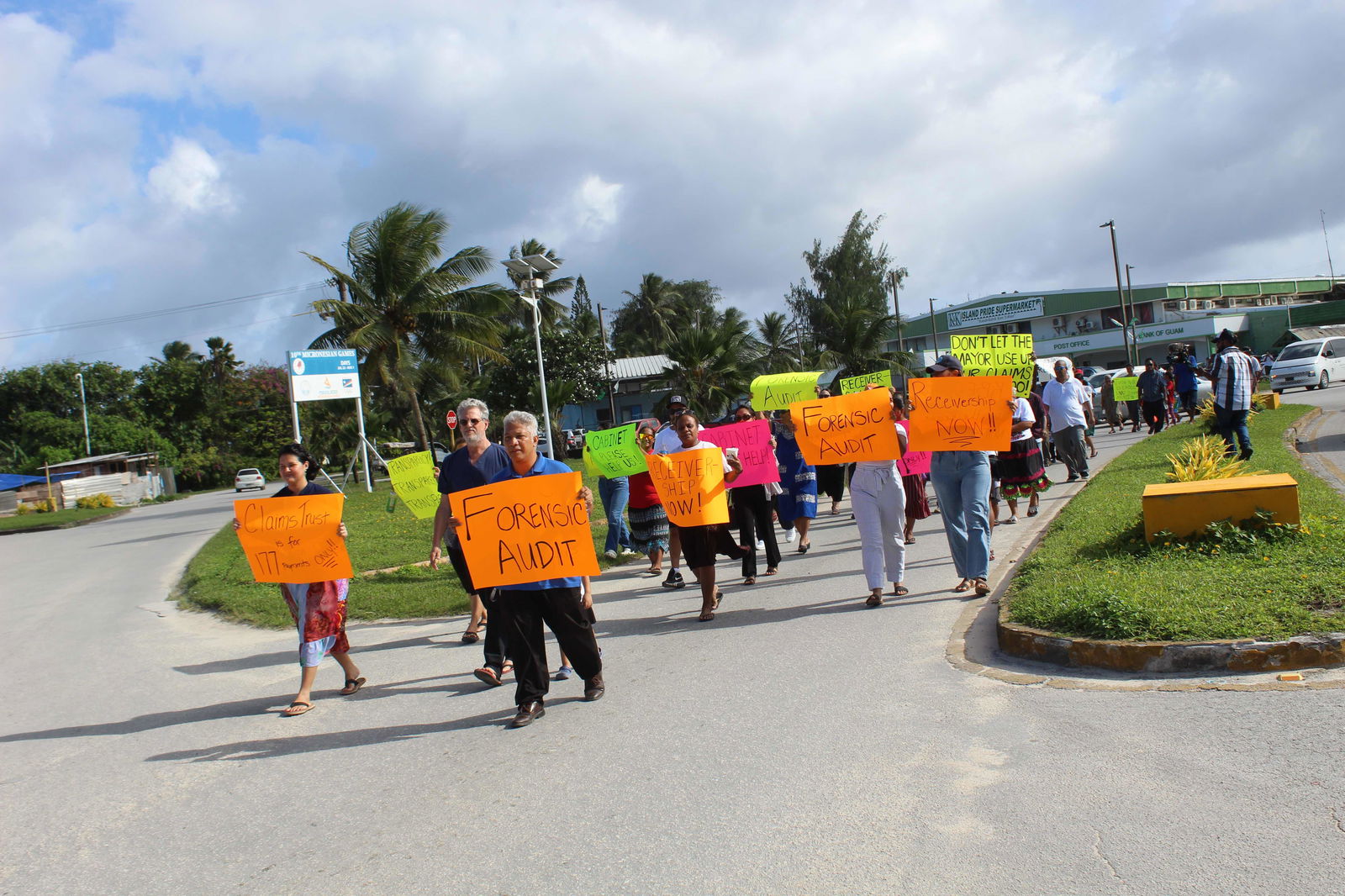
Bikini islanders marched along Majuro’s single main road Thursday to the capital building, demanding that the national government place the Bikini local government into receivership and launch investigations into spending that has exhausted a trust fund that as recently as 2017 held $71 million.
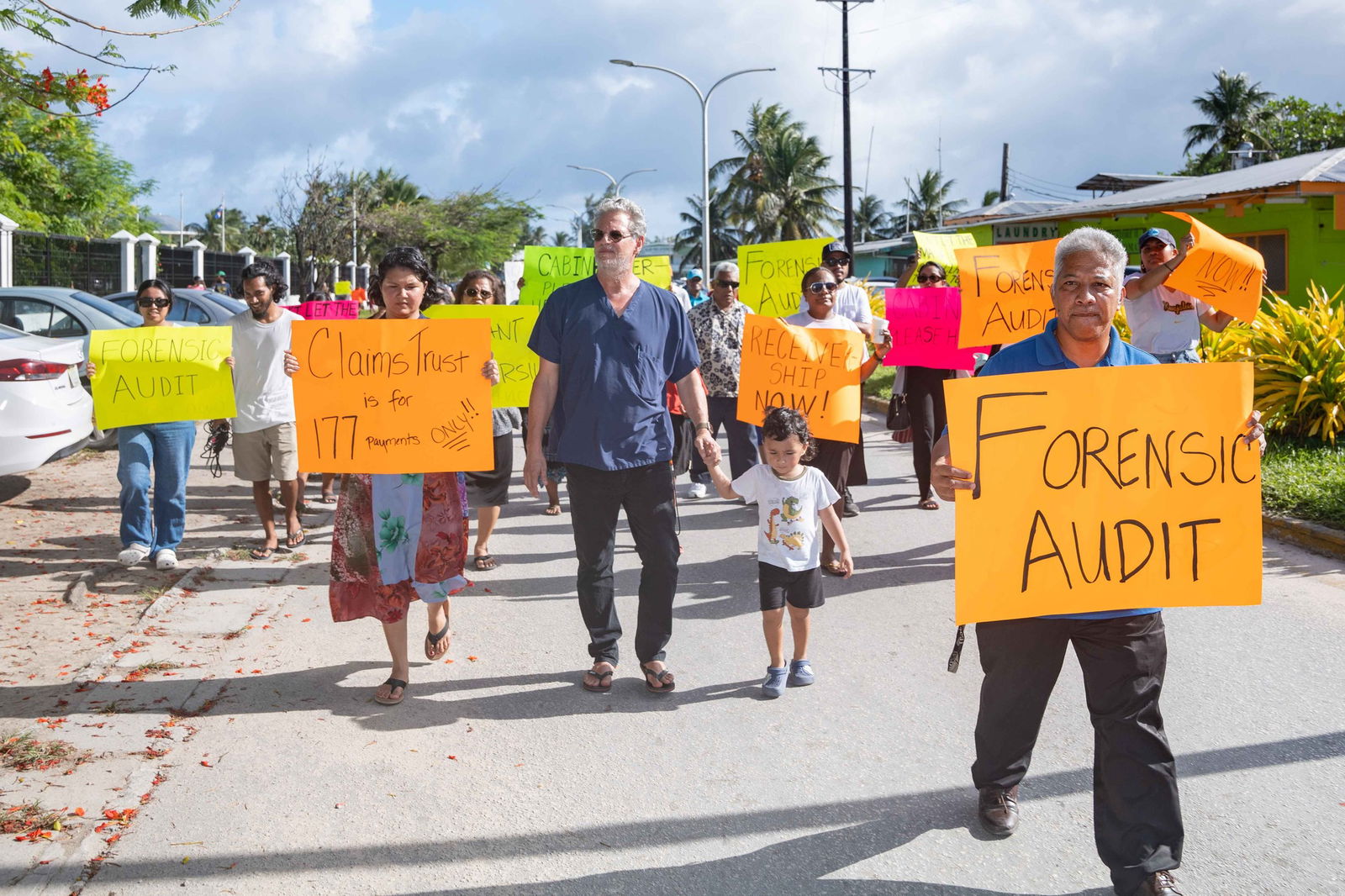
Bikini islanders marched along Majuro’s single main road Thursday to the capital building, demanding that the national government place the Bikini local government into receivership and launch investigations into spending that has exhausted a trust fund that as recently as 2017 held $71 million.






